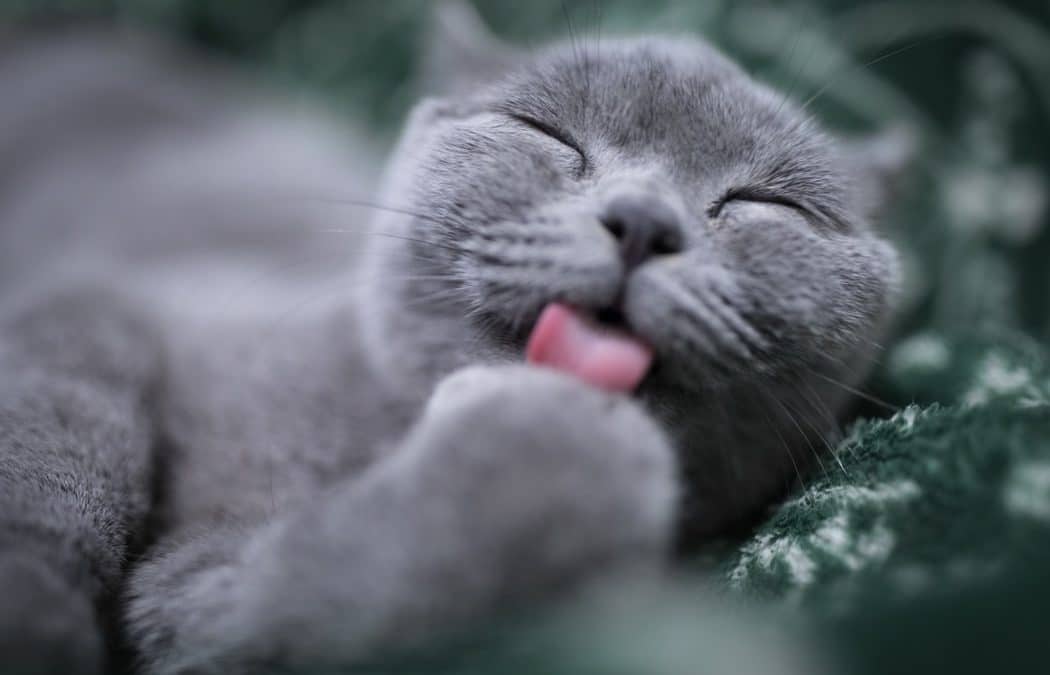April 30th was Hairball Awareness Day 2021, so the caring vets at East Valley Animal Hospital want to share some ways to prevent hairballs in your cat. While hairballs can be harmless, sometimes they can be dangerous, and understanding hairball prevention is an important aspect of keeping your cat healthy.
What Is a Hairball Anyway?
Hairballs are almost exactly what they sound like: a wad of hair. These cylindrical masses of hair are the byproduct of a cat’s grooming habits. The scientific term for a hairball is a trichobezoar, and it is essentially a mass of hair that your cat was unable to digest, glued together by digestive fluids.
Hairballs form because cats groom themselves by licking their coats, which means they tend to swallow a lot of their own hair. The occasional hairball is not too much to worry about, but if your cat is coughing up a lot of hairballs, or is acting tired and doesn’t want to eat, there could be a bigger problem.
Which Cats Are at Risk?
When it comes to preventing hairballs for your cat’s health, there are a few things to consider. Your cat’s age and breed can play large roles in determining how much action you should take in hairball prevention. Older cats and long haired cats are the most likely to have issues with hairballs.
Older Cats
Older cats tend to be much more efficient groomers than younger cats, which can lead to a higher risk of hairballs. Caring for older cats is somewhat different to caring for kittens or younger cats, as older cats have different needs. Because older cats are more likely to get hairballs, monitoring them closely is an important measure to keep them healthy.
Long-Haired Cats
Long-haired cats not only have a higher risk of hairball complications because of the length of their fur, but also because they tend to spend more time grooming themselves. Breeds like Maine Coons and Persians, who have long thick coats, often have the most trouble with hairballs.
Cats With Other Health Concerns
If you have a cat who deals with other health complications, you will want to watch out for hairballs. Because hairballs can cause blockages in a cat’s digestive system, a cat with other health concerns may be at higher risk.
Hairball Prevention
There are several methods of hairball prevention that don’t specifically require hairball medication. These are things that can (and should) be done daily to make sure your cat stays healthy and content.
Grooming
Since cats get hairballs because they groom themselves, doing the grooming for them is one of the best hairball prevention measures. The time and effort daily grooming will take can depend on many different factors, including change of season. For the best grooming experience for both you and your cat, always make sure you are using the right tools and being gentle with your feline friend.
Beat Boredom
It might seem like an odd tip, but cats will sometimes groom themselves excessively when they are bored. There are a lot of ways to keep your cat entertained and engaged, through play, window perches, and interactive toys.
Digestion
Because hairballs are made up of undigested hair, making sure your cat has healthy digestion is a key component of hairball prevention. Hydration aids digestion, so make sure your cat always has access to fresh clean water. Some cats may be picky about where they use the bathroom, so giving them a clean litter box in a comfortable and private area is a great way to encourage regular litter box use.
Hairball Medication
Sometimes basic hairball prevention isn’t enough, and your cat may need some help passing them. This is where hairball medication comes in. Before using a hairball remedy or medication, you should always consult with your vet to make sure you get the appropriate remedy.
There are many different over the counter hairball medications that will aid in binding the hair in your cat’s digestive tract so that they can pass it more easily. In some cases you may need to change your cat’s diet to a food that supports the passing of hairballs and healthy digestion.
Got Hairballs? Contact Us!
If you have questions or concerns about hairballs and how they could be affecting your cat’s health, the staff here at East Valley Animal Hospital would love to see you and your furry friend. We want to set you up on the right track for hairball prevention and make sure your cat stays healthy! You can schedule an appointment online or by calling us at 480-568-2462.

